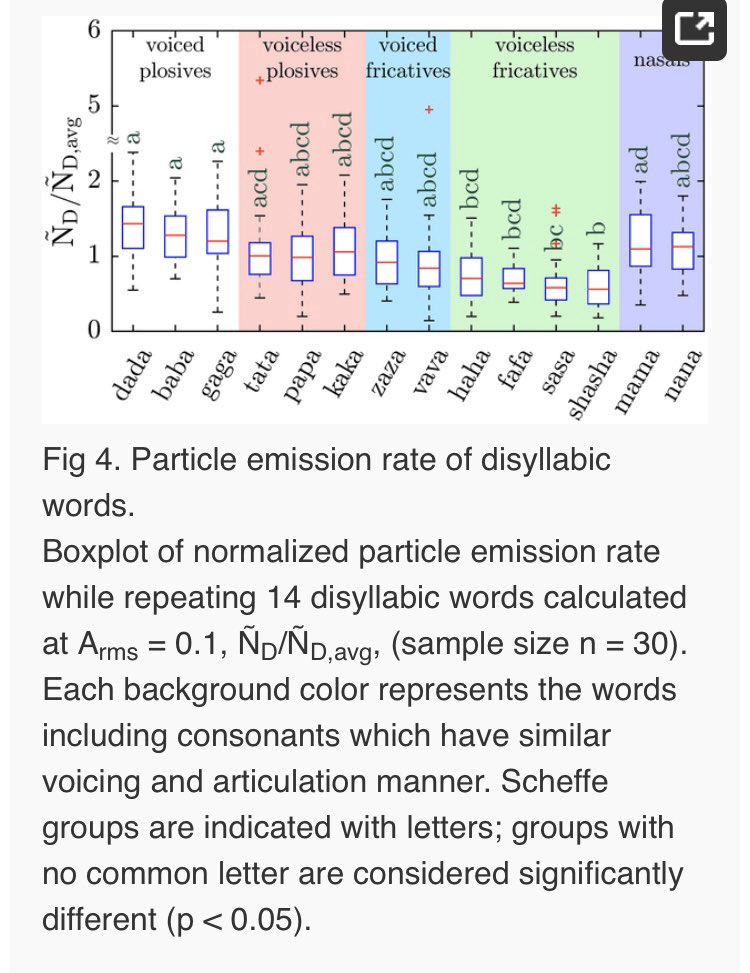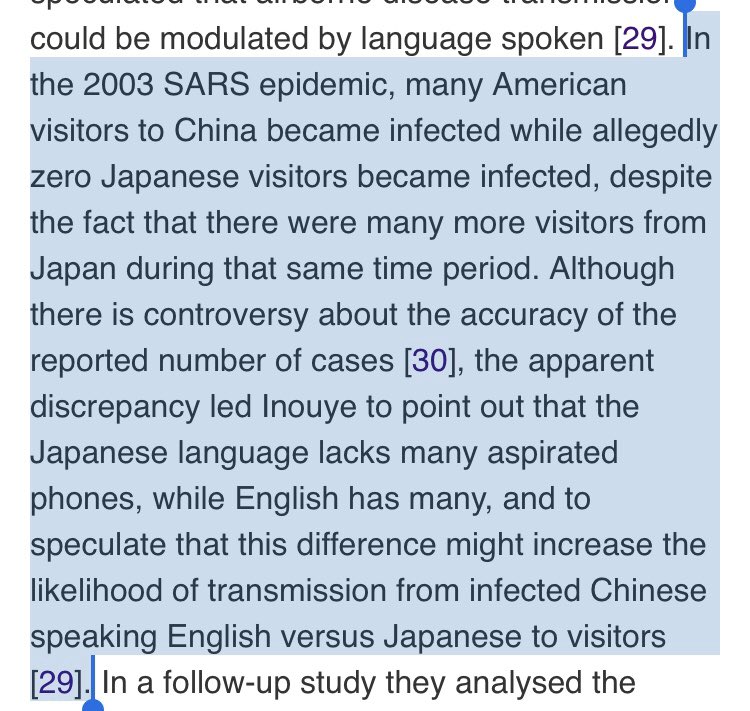Anyone checked this factor’s effect on covid transmission yet?
“particle emission rates were positively correlated with the vowel content of a phrase; conversely, particle emission decreased during phrases with a high fraction of voiceless fricatives.” https://journals.plos.org/plosone/article?id=10.1371/journal.pone.0227699">https://journals.plos.org/plosone/a...
“particle emission rates were positively correlated with the vowel content of a phrase; conversely, particle emission decreased during phrases with a high fraction of voiceless fricatives.” https://journals.plos.org/plosone/article?id=10.1371/journal.pone.0227699">https://journals.plos.org/plosone/a...
Again, superspreaders are a thing, and it’s not just that they are unusually social.
“subjects known as superemitters, who emit an order of magnitude greater number of particles than other individuals” https://twitter.com/diviacaroline/status/1246119012712329216?s=21">https://twitter.com/diviacaro...
“subjects known as superemitters, who emit an order of magnitude greater number of particles than other individuals” https://twitter.com/diviacaroline/status/1246119012712329216?s=21">https://twitter.com/diviacaro...
“Statistical analysis using Scheffe’s method suggests that, in general, voiced consonants yield more aerosol particles than voiceless, and that plosives yield more particles than fricatives”
“The rainbow is a division of white,” yielded on average the largest number of particles
“a sign from the gods to foretell war,” yielded the least
“a sign from the gods to foretell war,” yielded the least
“for both bilingual and monolingual subjects the wind pressure and puff strength are weaker for Japanese language than English and Chinese; in contrast, they found no significant difference between English and Chinese languages.”
The researcher speculated that language differences could have been part of why Americans visiting China were more likely to get SARS than Japanese speakers were.
I found this study bc I was looking for studies on singing and transmission of respiratory diseases.
This study doesn’t address that directly, but if loud vowels create more respiratory emissions, that lends more support to the idea that singing would be especially infectious.
This study doesn’t address that directly, but if loud vowels create more respiratory emissions, that lends more support to the idea that singing would be especially infectious.
This study also had a bunch of results that seem quite relevant for covid epidemiology!
-speaking emits much more than breathing
-speaking loudly emits more but doesn’t seem to change particle size
-language doesn’t matter (contrary to the other study) https://www.ncbi.nlm.nih.gov/pmc/articles/PMC6382806/">https://www.ncbi.nlm.nih.gov/pmc/artic...
-speaking emits much more than breathing
-speaking loudly emits more but doesn’t seem to change particle size
-language doesn’t matter (contrary to the other study) https://www.ncbi.nlm.nih.gov/pmc/articles/PMC6382806/">https://www.ncbi.nlm.nih.gov/pmc/artic...
Some people really are super spreaders!
I wonder how cheaply we could identify who the superpreaders are https://abs.twimg.com/emoji/v2/... draggable="false" alt="🤨" title="Face with raised eyebrow" aria-label="Emoji: Face with raised eyebrow">.
https://abs.twimg.com/emoji/v2/... draggable="false" alt="🤨" title="Face with raised eyebrow" aria-label="Emoji: Face with raised eyebrow">.
“One participant (F3) released as many as 200 particles per second at higher amplitudes; another (F2) released as few as 1 particle per second at lower amplitudes.”
I wonder how cheaply we could identify who the superpreaders are
“One participant (F3) released as many as 200 particles per second at higher amplitudes; another (F2) released as few as 1 particle per second at lower amplitudes.”
“counting aloud for 10 seconds followed by 10 seconds of breathing, repeated over two minutes, releases half as many particles as 30 seconds of continual coughing, which in turn releases half as many particles as saying “aah” for 30 seconds”
Also, whispering emits less.
Also, whispering emits less.

 Read on Twitter
Read on Twitter



